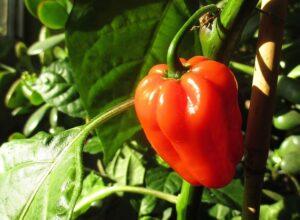Hungary is building on paprika: 10th place in Europe in fresh paprika exports, 5th in dried ones
Pepper is a product that is associated with Hungary worldwide. It finds its place in traditional goulash, lecsó or paprika dishes, and its dried form is a symbol of national cuisine. It appears in markets and in the suitcases of tourists returning home from Hungary. According to an analysis by experts from the international financial institution Akcenta, in 2024 the export of fresh and dried paprika brought a total of 40.7 million euros to the Hungarian economy. The sale of spice paprika shows particularly good results, which secured Hungary 5th place in Europe and 12th place in the world. Although paprika remains one of the country’s important exports, drought and high temperatures are causing plantations to shrink and Hungary is increasingly having to import to replace its domestic supply.
 Pepper has become a symbol of Hungarian cuisine, and its advantage is the unique flavor that the special climatic conditions of the southern Great Plain provide. However, in recent years, we have increasingly felt the effects of weather changes. Droughts and heat waves can reduce the harvest by up to half, and plantation areas have been shrinking for decades. As a result, although our paprika reaches Germany, Slovakia and France – and is highly valued there – Hungary also has to ensure imports from more distant countries, such as Spain or China. In the case of spicy paprika in particular, a negative foreign trade balance can be observed. This also shows that the global demand for Hungarian peppers exceeds our domestic production capabilities.
Pepper has become a symbol of Hungarian cuisine, and its advantage is the unique flavor that the special climatic conditions of the southern Great Plain provide. However, in recent years, we have increasingly felt the effects of weather changes. Droughts and heat waves can reduce the harvest by up to half, and plantation areas have been shrinking for decades. As a result, although our paprika reaches Germany, Slovakia and France – and is highly valued there – Hungary also has to ensure imports from more distant countries, such as Spain or China. In the case of spicy paprika in particular, a negative foreign trade balance can be observed. This also shows that the global demand for Hungarian peppers exceeds our domestic production capabilities.
– said Kusala Eduard, Commercial Director of Akcenta’s Hungarian office.
Fresh pepper exports under pressure
According to data from the International Trade Center, in 2024, Hungary exported fresh peppers worth 27.3 million euros. This was a quarter lower than the previous year, which resulted in the weakening of Hungary’s position in global trade. We currently rank 22nd in the world and 10th in Europe.
Most fresh peppers went to Germany, where the value of purchases reached 14.6 million euros. Other important target markets: Slovakia with 4.4 million euros, the Czech Republic with 2.9 million euros, Austria with 2.5 million euros and Switzerland with 1.3 million euros.
Spice paprika gives it a strong position in Europe
Although dried paprika – classified as a spice – brings in lower revenue than the trade in fresh paprika, Hungary achieves a much better position in the world and European rankings in this category. In 2024, the export value amounted to 13.4 million euros, which is an annual increase of 14%. Thanks to this, we are 12th in the world and 5th in Europe.
The largest buyer of Hungarian spice paprika is Germany, which increased its purchases to 3.9 million euros. Dynamic growth can also be observed in Slovakia, where sales jumped to 2.9 million euros. The only major market where a decline was recorded was Romania: exports there fell to 1.5 million euros (-16%).
The foreign trade balance is not always favorable
Despite the good export position, we increasingly resort to imports. In 2024, Hungary imported fresh peppers worth 26.1 million euros, which is 33% more than the previous year, so the foreign trade balance remained only slightly positive (+1.2 million euros). The largest suppliers are Spain (13.7 million euros, +90%), Egypt (4.2 million euros, -5%) and Slovakia (1.6 million euros, +36%).
For dried peppers, the balance remained negative (-2.1 million euros), as imports amounted to 15.5 million euros. The goods came mainly from Spain (5.7 million euros, +30%), China (3.7 million euros, +49%) and Slovenia (1.7 million euros), which has only become a supplier in recent years.
Farmers and businesses in this sector are currently working under extremely difficult conditions. The harvest depends on the weather, which is increasingly unpredictable, and is accompanied by geopolitical factors, customs and trade policies, and exchange rate fluctuations. All this means that the export and import of paprika – like many other agricultural products – is associated with high risk. Therefore, it is particularly important to use tools that help mitigate this risk. With the right solutions, you can avoid exchange rate losses and keep more cash in your business – which is the key to stable development in these uncertain times.
– says Kusala Eduard, Commercial Director of Akcenta’s Hungarian office.
Related news
Related news
Nestlé to sell remaining ice-cream assets but commits to Froneri venture
🎧 Hallgasd a cikket: Lejátszás Szünet Folytatás Leállítás Nyelv: Auto…
Read more >








